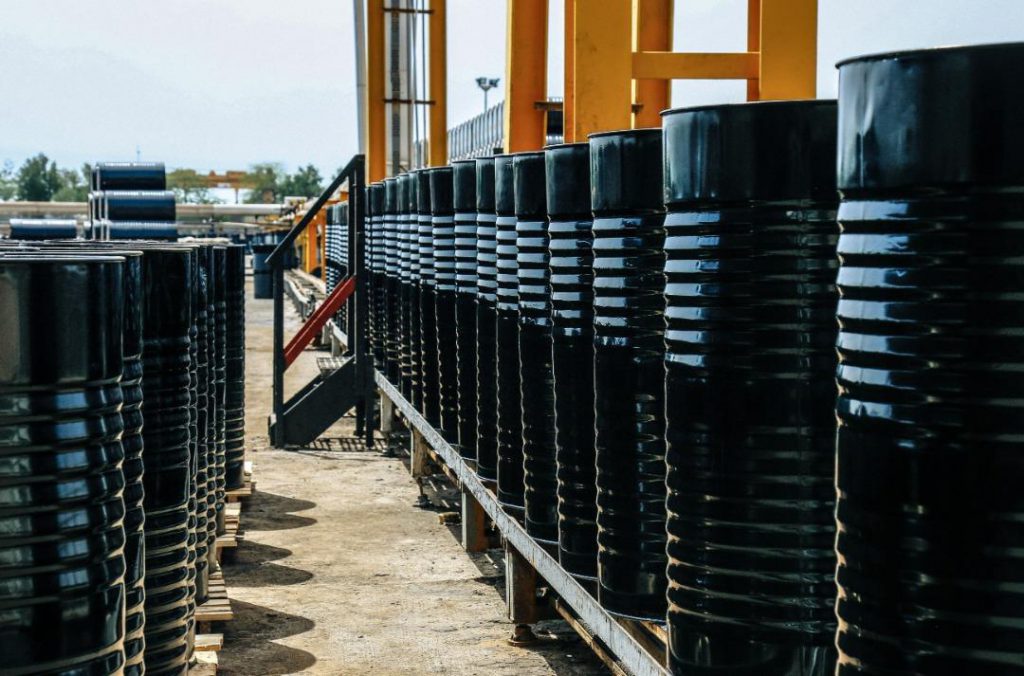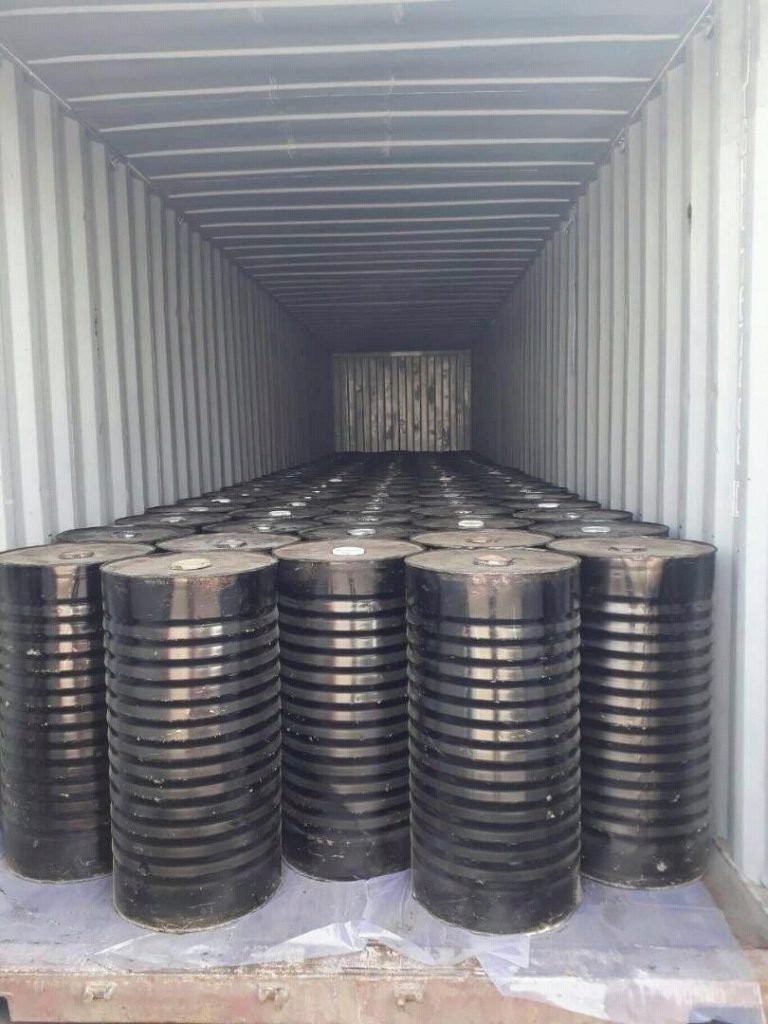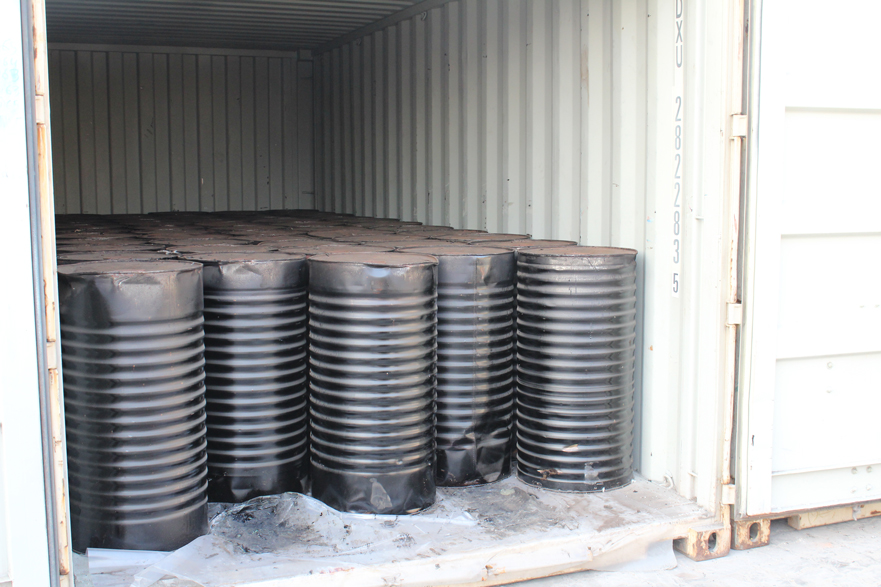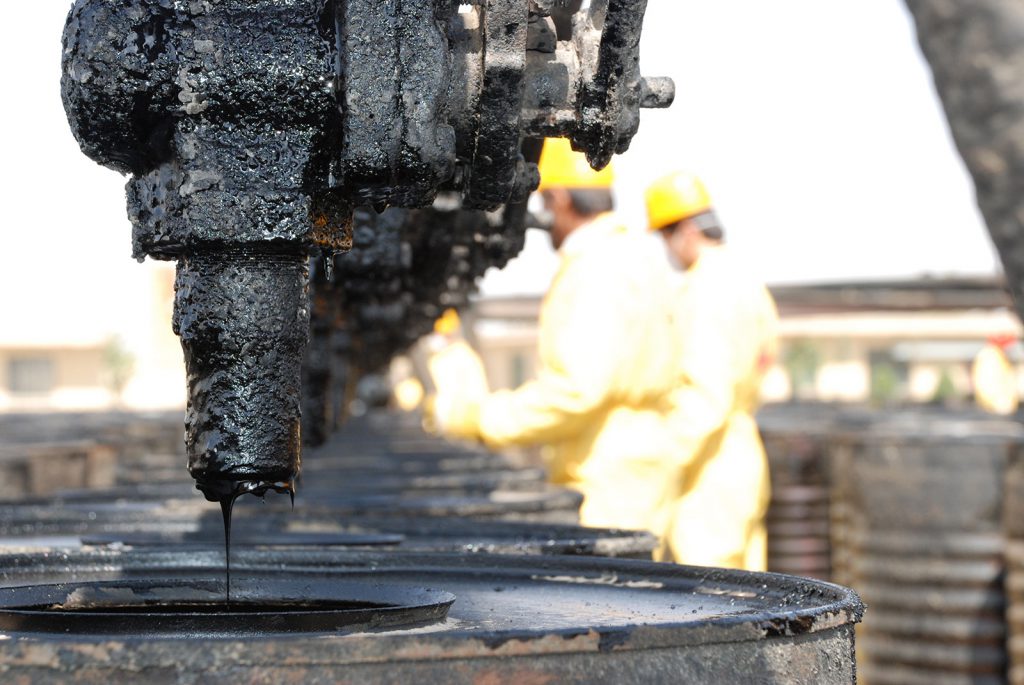Bitumen Penetration Grade 40/50
Bitumen Penetration Grade 40/50 Description

Bitumen penetration grade 40/50 bitumen means the penetration value is in the range 40 to 50 at standard test conditions which commonly used as a Paving Grade. Bitumen is applicable for the production of hot mix asphalt for bases and pavements and for road construction. Penetration Grade Bitumen supplied by HJ Oil is produced through aeration on vacuum bottom (the raw material used for making bitumen left in vacuum distillation column in oil refineries) in bitumen production units. Its penetration grade ( the measure of bitumen hardness) is between 40 to 50. Bitumen is specified by the penetration and softening point test. Designing is by penetration range only. The penetration grade bitumen has a thermoplastic property which causes the material to soften at high temperatures and to harden at lower temperatures. This unique temperature-viscosity relationship is important when determining the performance parameters such as the adhesion, rheology, durability, and application temperatures of bitumen.
The Bitumen mode is dependent on temperature. The temperature-vs-stiffness relationship of bitumen is dependent on the type of crude oil and its refining method. Bitumen penetration grade 40/50 is semi-hard penetration grade bitumen used as a paving grade bitumen which is suitable for road construction and repair. It is also used for the production of asphalt pavements with the technical specification. This grade of bitumen is mainly used in the manufacturing of hot mix asphalt for bases and wearing courses. Bitumen 40/50 is one of the most used bitumen grades and it’s a basic material for all other bituminous products.
Bitumen Penetration Grade 40/50 Applications
Bitumen 40/50 is Suitable for road construction and for the asphalt pavements with superior properties. This type of bitumen used in the manufacture of hot mix asphalt for bases and wearing courses and the main usage of this product is used in the road in tropical regions. the bitumen is provided during the presses of oxidation of vacuum bottom in bitumen production units. Due to its high air blowing and penetration, it is used in tropical areas with the Warm weather. It is not softened at high temperatures and does not fail its qualities.
Guaranty and safety of bitumen 40/50
HJ Oil guaranty the quality of bitumen penetration grade 40/50 with the arrangement of the international inspector to check quality and quantity during the loading to the vessel and controlling the production by QC by batch test report before shipping. HJ Oil guarantees the quality to meet with ASTM.
Bitumen Penetration Grade 40/50 Specifications
| Bitumen 40/50 | Test method | Unit | Specification |
| Specific gravity @ 25°c | ASTM D70 | Kg/cm3 | 1.01/1.06 |
| Penetration @ 25°c | ASTM D5 | mm/10 | 40/50 |
| Softening point °c | ASTM D36 | °C | 52/60 |
| Ductility @25 °c | ASTM D113 | cm | 100 min |
| Loss on heating(wt) % | ASTM D6 | wt % | 0.2 max |
| Drop in penetration after heating % | ASTM D5-D6 | % | 20 max |
| Flash point °c | ASTM D92 | °C | 250 min |
| Solubility is CS2(wt) % | ASTM D4 | wt % | 99.5 min |
| Spot test | A.A.S.H.O.T102 | Negative |
Bitumen Penetration Grade 30/40
Bitumen Penetration Grade 30/40 Description

The bitumen penetration grade 30/40 supplied by HJ Oil is produced from the vacuum residue (short residue) feedstock. penetration grade bitumen is specified by the penetration and softening point test. designation by penetration range only. The penetration grade bitumen has a thermoplastic property that causes the material to soften at high temperatures and to harden at low temperatures. It is a kind of bitumen and standard penetration grade. This type is petroleum grade bitumen, manufactured from fractional- vacuum destination of crude oil.
The Bitumen mode is dependent on temperature. The temperature-vs-stiffness relationship of bitumen is dependent on the type of crude oil and its refining method. Bitumen penetration grade 30/40 is semi-hard penetration grade bitumen used as a paving grade bitumen which is suitable for road construction and repair. It is also used for the production of asphalt pavements with the below technical specification. This grade of bitumen is mainly used in the manufacturing of hot mix asphalt for bases and wearing courses. This Bitumen is one of the most used bitumen grades and it’s a basic material for all other bituminous products
Penetration determines the hardness of bitumen by measuring the depth to which a standard loaded the needle will vertically penetrate in 5 seconds, in a sample of bitumen maintained at a temperature of 25 degrees Celsius.
Bitumen 30/40 Applications
Bitumen 30/40 is suitable for road construction and repair for the asphalt pavements with superior properties. This type of bitumen used in the manufacture of hot mix asphalt for bases and wearing courses.
Guaranty & Safety of 30/40
HJ Oil guarantees the quality of bitumen penetration grade 30/40 with the arrangement of the international inspector to check quality and quantity during the loading to the vessel and controlling the production by QC by batch test report before shipping. HJ Oil guarantees the quality to meet with ASTM.
Bitumen Penetration grade 30/40 Specifications
| Bitumen 30/40 | Test method | Unit | Specification |
| Specific gravity @ 25°c | ASTM D70 | Kg/cm3 | 1.01/1.06 |
| Penetration @ 25°c | ASTM D5 | mm/10 | 30/40 |
| Softening point °c | ASTM D36 | °C | 55/63 |
| Ductility @25 °c | ASTM D113 | cm | 100 min |
| Loss on heating(wt) % | ASTM D6 | wt % | 0.2 max |
| Drop in penetration after heating % | ASTM D5-D6 | % | 20 max |
| Flash point °c | ASTM D92 | °C | 250 min |
| Solubility is CS2(wt) % | ASTM D4 | wt % | 99.5 min |
| Spot test | A.A.S.H.O.T102 | Negative |

Bitumen Penetration Grade 10/20
Bitumen Penetration Grade 10/20 Description

Bitumen penetration grade 10/20 ensures long-term savings because it allows for a thinner pavement design, which uses up to 30% less asphalt than traditional designs while ensuring extended pavement life. HJ exporting bitumen 10/20 its penetration hard grade and softening between 10 to 20. bitumen 10/20 is hard penetration grade bitumen using as paving grade bitumen suitable for road construction and repair also for the production of asphalt pavements with the below technical specification. This grade of bitumen is mainly used in the manufacture of hot mix asphalt for bases and wearing courses. It is a kind of hard penetration grade bitumen that is provided during the process of oxidation of vacuum bottom the bitumen production that derives from distillation tower residue in vacuum oil refineries at the bitumen production unit.
Penetration Grade Bitumen is a standard bitumen usually used as a Paving Grade Bitumen essential for road construction and for the production of asphalt pavements with superior properties, and it’s very important once it bounds the aggregates and creates a unique cohesion and stability to the bituminous mix.
Bitumen 10/20 Applications
Bitumen 10/20 is suitable for road construction and repair for the asphalt pavements with superior properties. This type of bitumen used in the manufacture of hot mix asphalt for bases and wearing courses and the bitumen 10/20 is also for the production of pavements.
Guaranty and Safety of Bitumen 10/20
HJ Oil guarantees the quality of bitumen 10/20 with the arrangement of the international inspectors to check quality and quantity during the loading to the vessel and controlling the production by QC by batch test report before shipping. HJ Oil Company guarantees the quality to meet with ASTM.
Bitumen Penetration 10/20 Specifications
| Bitumen 10/20 | Test method | Unit | Specification |
| Specific gravity @ 25°c | ASTM D70 | Kg/cm3 | 1.01/1.06 |
| Penetration @ 25°c | ASTM D5 | Mm/10 | 10/20 |
| Softening point °c | ASTM D36 | °C | 58/66 |
| Ductility @25 °c | ASTM D113 | Cm | 100 min |
| Loss on heating(wt) % | ASTM D6 | wt % | 0.2 max |
| Drop in penetration after heating % | ASTM D5-D6 | % | 20 max |
| Flashpoint c | ASTM D92 | °C | 250 min |
| Solubility is CS2(wt) % | ASTM D4 | wt % | 99.5 max |
| Spot test | A.a.s.h.o.t102 | Negative |
Packing of Bitumen Penetration Grade 10/20
Bitumen 10/20 is commonly packed in new steel drums, 150, 180 & 220 Kg barrels and Jumbo Bags or Bitubag and 10 & 20kg Tubular carton.
SBS Modified Bitumen Roll Sheet
SBS Modified Bituminous Membrane Sheet Description

SBS Modified Bitumen Roll Sheet is made using SBS (Best Bitumen Modifier) polymer-modified bitumen and polyester film in rolls of 1 mm wide and 4 mm thickness. The dimensions of each roll are 10 square Meters.
The combination of bitumen modified with SBS polymer and tear-resistant polyester film has made waterproofing unique and has unique properties that make it completely distinct from similar products, including Characteristics are the ability to withstand cold and excellent flexibility in cold, mechanical properties and remarkable tensile strength, excellent adhesion to a variety of building materials and a very important self-repairing property. waterproofing is the best option for insulating sensitive and important structures.
Bitumen Roll sheet is available on a variety of finishes in silica powder, mineral aggregate, aluminum foil, and polyethylene film on request.
SBS Modified Bitumen Roll Sheet Characteristics
Distilled bitumen modified with a high percentage of SBS elastomeric polymers that ensure excellent properties of adherence, elasticity, and extreme flexibility at low temperatures. Due to the chemical properties of thermo-plastic rubber, the membrane should be protected against direct sunlight which triggers a process of early aging.
SBS Modified Applications
Exceptional performance in applications requiring above average resistance to repeated thermal-mechanical action. Metal, prefabricated flat, curved or saw tooth roofs subject to cyclic movements or considerable dimensional variations. Also widely used in underground tanking to waterproof basements and foundations, especially in areas with high humidity in the ground or close to the sea.
Advantages of SBS Modified Bitumen Roll Sheet
- Compatibility with all types of flat roofing applications, but can also be used to waterproof car park decks, bridge decks, green roofs, etc.
- Resistance to the most extreme weather conditions such as high and low temperatures, rain, snow, ice, and the freeze-thaw process.
- The life expectancy of the SBS bitumen membrane is remarkable, even after aging it retains its pliability and elasticity, making it the ideal flat roof solution.
- Dimensional stability is provided by the high-quality SBS bitumen blend together with a high-performance reinforcement, enabling the waterproofing system to accommodate building movement.
- Installation is simple and can be achieved through a variety of methods; torch-applied, mechanically fixed, or adhered, depending on the specification and suitability.
- Security and peace of mind for the building owner is achieved through the installation of a robust, multilayer, built up felt SBS modified bituminous waterproofing system.
- High resistance to mechanical damage and puncturing in comparison to alternative flat roof coverings. Extreme resistance variants are available depending on the traffic requirements of the surface.
- Excellent adhesion to the substrate on a flat roof installation (demonstrated by peel testing)
- Quality control is increased when installing factory produced rolls of SBS modified bitumen.
- In most cases, when a bituminous flat roof system reaches the end of its service life, a single layer overlay can be installed over the top of the existing system to extend and renew the longevity of the waterproofing system.
Guarantee
Bitumen Roll Sheet Guaranteed by more than 25 years in the field, excellent aging properties, extensive thermal operating range (-20/+100), versatile and reliable at any latitude, fast and easy to apply even on structures with complex shapes.
SBS Modified Membranes Specifications
| SBS Modified by Thickness | Unit | TSG 2 | TSG 3 | TSP 3 | TSP 4 | TSP 3S* | TSP 4S* | TSAL2 | TSP3 AL | TSP4 AL | TSP3 F* | TSP4 F* | TSP40A | TSP50A |
| Reinforcement | GlassFiber | GlassFiber | Polyester | Polyester | Polyester | Polyester | Aluminum | Polyester | Polyester | Polyester | Polyester | Polyester | Polyester | |
| Thickness | mm | 2 | 3 | 3 | 4 | 3.5 | 4.5 | 2 | 3 | 4 | 4 | 4 | 3,5 | 4,5 |
| Flow Resistance | °C | 100 | 100 | 100 | 100 | 100 | 100 | 100 | 100 | 100 | 100 | 100 | 100 | 100 |
| Cold Bending | °C | -20 | -20 | -20 | -20 | -20 | -20 | -20 | -20 | -20 | -20 | -20 | -20 | -20 |
| Tensile Strength | (N/50mm) (md/cmd) | 400/300 | 400/300 | 800/600 | 800/600 | 800/600 | 800/600 | NA | 800/600 | 800/600 | 800/600 | 800/600 | 800/600 | 800/600 |
| Elongation | % (md/cmd) | 2/2 | 2/2 | 35/35 | 35/35 | 35/35 | 35/35 | NA | 35/35 | 35/35 | 35/35 | 35/35 | 35/35 | 35/35 |
| Upper Surface Coating | – | PE | PE | PE | PE | Slated | Slated | PE | Aluminum | Aluminum | Fine Sand | Fine Sand |
APP Modified Bitumen Roll Sheet
APP Modified Bitumen Roll Sheet Description

APP Modified Bitumen Roll Sheet is a plastic bitumen blend, which is modified using plastic in the form of atactic polypropylene (APP). As installers begin to torch-apply APP, this type of plastic begins to melt at a point of 300F, where it melts into a liquid wax-like substance that acts as an almost free-flowing liquid which can then be mopped across a surface. APP has a high-temperature tolerance when heating, so is more user-friendly for installers.
This ease of melting makes APP bitumen popular on smaller roofs such as residential properties and commercial flat roofs.
The main advantages of our APP membranes
- Enhanced bitumen performance by increasing UV resistance
- Increasing flexibility at low temps
- Improving flow resistance at high temps
- Excellent weathering
- Fire resistant properties
- Climate adaptability
- Applicable on all sloping surfaces: on flat, vertical and curved surfaces.
- Excellent product for all weather conditions.
- Lightweight: prevents any excessive weight on the roof or the building structure.
- Good resistance to fatigue and tear.
- Longer lasting product (up to fifteen years)
General Data
- Nominal Roll Length: 10m
- Nominal Roll Width: 1m
- Nominal Thickness: 2-5 mm
Outstanding Features of APP Modified Bitumen Membrane
- Applicable on all sloping surfaces: on flat, vertical and curved surfaces.
- Excellent product for all weather conditions.
- Lightweight: prevents any excessive weight on the roof or the building structure.
- Good resistance to fatigue and tear.
- Longer lasting product (up to fifteen years)
Application Fields of APP Modified Bitumen Membrane
Tavoil APP Modified bitumen roll sheet may be used for a wide range of waterproofing applications including roofs, terraces, reservoirs, basement walls, tunnels and car parks.
APP Modified Membrane Characteristics
| APP Series by Thickness | Unit | TAPPG 2 | TAPPG 3 | TAPPP 3 | TAPPP 4 | TAPPP 35S | TAPPP 45S | TAPPP3 AL | TAPPP4 AL | +PP3 F* | +PP4 F* |
| Reinforcement | GlassFiber | GlassFiber | Polyester | Polyester | Polyester | Polyester | Polyester | Polyester | Polyester | Polyester | |
| Thickness | mm | 2 | 3 | 3 | 4 | 3.5 | 4.5 | 3 | 3 | 4 | 4 |
| Flow Resistance | °C | 120 | 120 | 120 | 120 | 120 | 120 | 120 | 120 | 120 | 120 |
| Cold Bending | °C | -10 | -10 | -10 | -10 | -10 | -10 | -10 | -10 | -10 | -10 |
| Tensile Strength | (N/50mm) (md/cmd) | 400/300 | 400/300 | 800/600 | 800/600 | 800/600 | 800/600 | 800/600 | 800/600 | 800/600 | 800/600 |
| Elongation | % (md/cmd) | 2/2 | 2/2 | 35/35 | 35/35 | 35/35 | 35/35 | 35/35 | 35/35 | 35/35 | 35/35 |
| Upper Surface Coating | PE | PE | PE | PE | Slated | Slated | Aluminum | Aluminum | Fine Sand | Fine Sand |
Viscosity Grade Bitumen 40
Viscosity Grade Bitumen 40 Description

Viscosity Grade Bitumen 40 is categorized according to Viscosity (degree of fluidity) grading. The higher the grade, the stiffer the Bitumen. In Viscosity Grade, Viscosity tests are conducted at 60°C and 135°C, which represents the temperature of the road surface during summer and mixing temperature respectively. The penetration at 25°C, which is the annual average pavement temperature, has been also retained in Specifications.
Viscosity Grade Bitumen 40 is used in highly stressed areas such as intersections, near toll booths, and truck parking lots in lieu of old 30/40 Penetration grade. Due to its higher viscosity, stiffer Bitumen mixes can be produced to improve resistance to shoving and other problems associated with higher temperatures and heavy traffic loads.
Viscosity Grade Bitumen 40 Applications
Viscosity Grade Bitumen 40 (Asphalt) is a standard grade Bitumen usually used as a Paving Grade Bitumen suitable for road construction and for the production of asphalt pavements with superior properties. This grade of Bitumen is mainly used in the manufacture of hot mix asphalt for bases and wearing courses and possesses characteristics and qualities unique sand quite different from other agents. They achieve very flexible and tenacious connections with other materials due mainly to the viscoelastic response of bitumen, which behavior depends on how fast charges are applied. Viscosity Grade Bitumen supplied by Tavoil is petroleum grade bitumen, manufactured from fractional / vacuum distillation of crude oil, which practical appliance and behavior vary according to its temperature. The Bitumen supplied by Tavoil is produced from the vacuum residue (short residue) feedstock. Viscosity Grade bitumens are specified by the methods described in ASTM Standard D3381–09 and AASHTO M226-80 (2008). Viscosity Graded specifications cover bitumen (asphalt) graded by Viscosity at 60 C (140 °F).
Used in ;
Airport
Highway
runway
Footway
Racetracks
VG-40 Packing
New Steel Drum, Bulk, and other packings based on the customers’ demands.
VG-40 Specification
| PROPERTIES | SPECIFICATIONS |
|---|---|
| Absolute Viscosity, 60°C, poises, min | 3200 |
| Kinematic Viscosity, 135°C, CST, min | 400 |
| Flash point, C, min | 220 |
| Solubility in trichloroethylene, %, min | 99.0 |
| Penetration at 25°C | 40-60 |
| Softening point, C, min | 50 |
| Viscosity ratio at 60°C, max | 4.0 |
| Ductility at 25°C, cm, min, (after thin film over test) | 25 |
Viscosity Grade Bitumen 30
Viscosity Grade Bitumen 30 Description

Viscosity Grade Bitumen 30 is categorized according to Viscosity (degree of fluidity) grading. The higher the grade, the stiffer the Bitumen. In Viscosity Grade, Viscosity tests are conducted at 60°C and 135°C, which represents the temperature of the road surface during summer and mixing temperature respectively. The penetration at 25°C, which is the annual average pavement temperature, has been also retained in Specifications.
It is a kind of bitumen, which is produced during the process of oxidation of the vacuum bottom in distillation tower and is categorized based on its viscosity grade. The main common usage of bitumen Viscosity Grade Bitumen 30 is primarily used to construct extra heavy duty Bitumen pavements that need to endure substantial traffic loads. Also, VG-30 is in road construction, waterproofing, building construction industries, and also in cutback bitumen production. It can be used in lieu of 60/70 Penetration grade. It is the most suitable for use in hot and rainy weather conditions and suitable to be used in mild regions.
Viscosity Grade Bitumen 30 Applications
Viscosity Grade Bitumen (Asphalt) is a standard grade Bitumen usually used as a Paving Grade Bitumen suitable for road construction and for the production of asphalt pavements with superior properties. This grade of Bitumen is mainly used in the manufacture of hot mix asphalt for bases and wearing courses and possesses characteristics and qualities unique sand quite different from other agents. They achieve very flexible and tenacious connections with other materials due mainly to the viscoelastic response of bitumen, which behavior depends on how fast charges are applied. Viscosity Grade Bitumen supplied by Tavoil is petroleum grade bitumen, manufactured from fractional / vacuum distillation of crude oil, which practical appliance and behavior vary according to its temperature. The Bitumen supplied by Tavoil is produced from the vacuum residue (short residue) feedstock. Viscosity Grade bitumens are specified by the methods described in ASTM Standard D3381–09 and AASHTO M226-80 (2008). Viscosity Graded specifications cover bitumen (asphalt) graded by Viscosity at 60 C (140 °F).
Used in ;
Pedestrian Ways
Car parks
Tennis courts
Roofing
Damp proofing
Dams
Reservoir and pool
VG-30 Packing
New Steel Drum, Bulk, and other packings based on the customers’ demands.
VG-30 Specification
| PROPERTIES | SPECIFICATIONS |
|---|---|
| Absolute Viscosity, 60°C, poises, min | 2400 |
| Kinematic Viscosity, 135°C, CST, min | 350 |
| Flash point, C, min | 220 |
| Solubility in trichloroethylene, %, min | 99.0 |
| Penetration at 25°C | 50-70 |
| Softening point, C, min | 47 |
| Viscosity ratio at 60°C, max | 4.0 |
| Ductility at 25°C, cm, min, (after thin film over test) | 40 |
Viscosity Grade Bitumen 20
Viscosity Grade Bitumen 20 Description

Viscosity grade bitumen 20 are categorized according to Viscosity (degree of fluidity) grading. The higher the grade, the stiffer the Bitumen. In Viscosity Grade, Viscosity tests are conducted at 60°C and 135°C, which represents the temperature of the road surface during summer and mixing temperature respectively. The penetration at 25°C, which is the annual average pavement temperature, has been also retained in Specifications.
Viscosity Grade Bitumen 20 is used for paving in cold climate & high altitude regions.
Viscosity Grade Bitumen 20 Applications
Viscosity Grade Bitumen (Asphalt) is a standard grade Bitumen usually used as a Paving Grade Bitumen suitable for road construction and for the production of asphalt pavements with superior properties. This grade of Bitumen is mainly used in the manufacture of hot mix asphalt for bases and wearing courses and possesses characteristics and qualities unique sand quite different from other agents. They achieve very flexible and tenacious connections with other materials due mainly to the viscoelastic response of bitumen, which behavior depends on how fast charges are applied. Viscosity Grade Bitumen supplied by Tavoil is petroleum grade bitumen, manufactured from fractional / vacuum distillation of crude oil, which practical appliance and behavior vary according to its temperature. The Bitumen supplied by Tavoil is produced from the vacuum residue (short residue) feedstock. Viscosity Grade bitumens are specified by the methods described in ASTM Standard D3381–09 and AASHTO M226-80 (2008). Viscosity Graded specifications cover bitumen (asphalt) graded by Viscosity at 60 C (140 °F).
Used in ;
linings
Soundproofing
Pipe coatings
Cable Coatings
Paints Building
Water Proofing
Tile underlying
waterproofing
Newspaper Ink
VG-20 Packing
New Steel Drum, Bulk, and other packings based on the customers’ demands.
VG-20 Specification
| PROPERTIES | SPECIFICATIONS |
|---|---|
| Absolute Viscosity, 60°C, poises, min | 1600 |
| Kinematic Viscosity, 135°C, CST, min | 300 |
| Flash point, C, min | 220 |
| Solubility in trichloroethylene, %, min | 99.0 |
| Penetration at 25°C | 60-80 |
| Softening point, C, min | 45 |
| Viscosity ratio at 60°C, max | 4.0 |
| Ductility at 25°C, cm, min, (after thin film over test) | 50 |
Viscosity Grade Bitumen 10
Viscosity Grade Bitumen 10 Description

Viscosity grade 10 of bitumens are categorized according to Viscosity (degree of fluidity) grading. The higher the grade, the stiffer the Bitumen. In Viscosity Grade, Viscosity tests are conducted at 60°C and 135°C, which represents the temperature of the road surface during summer and mixing temperature respectively. The penetration at 25°C, which is the annual average pavement temperature, has been also retained in Specifications. Viscosity Grade Bitumen 10 is mostly used in spraying applications such as paving in cold regions. VG 10 is an alternative for bitumen 80/100 penetration grade. It also acts as a feedstock in manufacturing Bitumen Emulsion and Modified Bitumen products.
Viscosity grade of bitumen can be done on original (as-supplied) asphalt binder samples (called AC grading) or aged residue samples (called AR grading). The AR viscosity test is based on the viscosity of aged residue from the rolling thin film oven test. With AC grading, the asphalt binder is characterized by the properties it possesses before it undergoes the HMA manufacturing process. The AR grading system is an attempt to simulate asphalt binder properties after it undergoes a typical HMA manufacturing process and thus, it should be more representative of how asphalt binder behaves in HMA pavements. Table 1 lists key advantages and disadvantages of the viscosity grading system.
Viscosity Grade Bitumen 10 Applications
Spraying applications, Paving
Packing
New Steel Drum, Bulk, and other packings based on the customers’ demands.
VG-10 Specification
| PROPERTIES | SPECIFICATIONS |
|---|---|
| Absolute Viscosity, 60°C, poises, min | 800 |
| Kinematic Viscosity, 135°C, CST, min | 250 |
| Flash point, C, min | 220 |
| Solubility in trichloroethylene, %, min | 99.0 |
| Penetration at 25°C | 80-100 |
| Softening point, C, min | 40 |
| Viscosity ratio at 60°C, max | 4.0 |
| Ductility at 25°C, cm, min, (after thin film over test) | 75 |
Bitumen Primer D41
Bitumen Primer D41 Description

Bitumen primer D41 is a solvent-based bituminous
primer suitable for general purpose roofing primer used as dressing to concrete, masonry, and metal surface and as a primer coat prior to application of membranes.
Bitumen Primer D41 Applications
– A cold applied solvent based bituminous primer.
– A bituminous liquid primer penetrates deep into the porous substrates to improve the adhesion of bituminous materials that are to be applied to the substrate.
– Conforms to the requirements of ASTM D41.
– General-purpose primer for concrete, masonry, and metal surfaces.
– As priming coat before applying and bituminous coating
– As priming coat before applying any waterproofing membrane
– Suitable for use as a primer below or above ground level
Cover Rate
Coverage rate varies from 0.3 ‐ 0.5 kg/sq.mt depending on the application method, surface properties, and condition of substrates.
Dry Time
Less than 4 hours, to touch depends on local weather conditions.
Preparatory Works
– The surface must be thoroughly cleaned and free from dust, dirt, oil, and grease.
– Bitumen primer D‐41 should be well stirred prior to use and applied to the substrate by means of brush, roller, or spray.
– After application doesn’t leave the primer exposed for more than 12‐ hrs, if this should be the case, apply a further coat and allow curing.
– Tools must be cleaned with any suitable solvents such as gasoline or kerosene.
Specification of Bitumen Primer D41
| Specification | RESULT | TEST METHOD |
| Color | Black | — |
| Viscosity Saybolt @ 25 °C | 25 – 125 sec | ASTM D 88 |
| Specific gravity @ 25 °C | 0.958 | ASTM D 1475 |
| Solubility in trichloro ethylene | 99.7% | ASTM D 2042 |
| Density | 0.85 ‐ 0.89 | ASTD D 70 |
| Distillation volume @ 225 °C | 37% | ASTM D ‐ 402/D422 |
| Distillation volume @ 260 °C | 39.5% | ASTM D ‐ 402/D422 |
| Distillation volume @ 360 °C | 42.5% | ASTM D ‐ 402/D422 |
| Asphalt residue @225 °C | 63% | ASTM D ‐402 |
| Asphalt residue @260 °C | 60.5% | ASTM D ‐402 |
| Asphalt residue @360 °C | 57.5% | ASTM D ‐402 |
| Water Content % | <0.3 Max | ASTM D6511/D95 |
| Flash Point | 45 OC | ASTM D 94 |
| Drying time | 8 ‐ 12‐Hours | In house |
| Coverage rate | 0.3 ‐ 0.5 Kg/mt2 | In house |
| Shelf life | 2‐years | In house |
Health, Safety and Environment
- use only with proper ventilation.
- Avoid contact with skin and eyes by careful working.
- Do not use near an open flame.
- It is advisable to use goggles and gloves.
- In case of eye contact immediately wash
- with cold water or consult the physician
All safety measures should be observed during the application. Fire extinguishers should be available at the site. Care should be taken with gas,
and torch should not be rested on the finished surface or on any materials that can be scratched by flame or hot torch. Gloves and goggles should be worn by all workers during application.
Read, understand and follow all Material Safety
Data Sheets and product label information for this
product prior to use.
